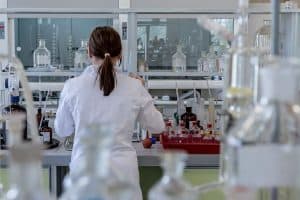
UC San Diego School of Medicine researchers treat atopic dermatitis with bacteriotherapy
pharmafile | February 24, 2021 | News story | Research and Development | atopic dermatitis, eczema
Researchers at the University of California San Diego School of Medicine have identified a universal strain of bacteria derived from healthy human skin that can treat atopic dermatitis, the most common type of eczema.
According to the National Eczema Association, nearly 18 million people in the US have atopic dermatitis, a chronic, itchy rash that commonly appears on the arms, legs and cheeks.
In the new study, the research team investigated the safety and mechanisms of the specific bacteria in a first-in-human, Phase I, double-blinded clinical trial looking to treat people living with eczema. The findings, published in Nature Medicine, showed that two-thirds of the 54 participants reported improvements in their symptoms, including fewer complaints of itchiness and inflammation.
Dr Richard Gallo, Ima Gigli Distinguished Professor of Dermatology and Chair of the Department of Dermatology at UC San Diego School of Medicine, said: “The main question we wanted to answer was if this was safe. This was a safety study.
“We found exactly what we hoped to find. The eczema of participants who received the bacterial treatment improved and there were no adverse events.”
The researchers screened more than 8,000 isolates of Staphylococcal bacteria obtained from the skin of individuals without eczema, and identified strains that inhibited growth of Staphylococcal aureus, a pathogenic bacterium that aggravates skin conditions like eczema. These strains were evaluated for additional characteristics, such as decreased capacity to damage skin, and sensitivity to common antibiotics.
The screening resulted in the identification of a single strain of bacteria called Staphylococcus hominis A9 that could be used for the treatment of atopic dermatitis.
Dr Gallo added: “This was one out of 8,000 strains that were tested in a dish for their ability to kill Staphylococcal aureus and treat atopic dermatitis. And it worked.”
Study co-author Dr Donald Leung, Allergist and Immunologist at National Jewish Health, also commented: “This research is a unique approach to targeting the harmful Staphylococcal aureus on atopic dermatitis skin with beneficial bacteria. It’s our hope this will help patients with eczema rid their skin of the harmful bacteria causing the inflammation.
“Future studies will determine if this new cream can be used for long periods of time to reduce the severity of eczema and improve the patient’s quality of life.”
Darcy Jimenez
Related Content

UCB announces first-in-patient trial success for galvokimig in atopic dermatitis
UCB has reported positive early clinical trial results for galvokimig, an investigational therapy for adults …

Dupixent improves symptoms in patients with skin of colour, study shows
Sanofi and Regeneron have announced results from the collaborative phase 4 DISCOVER study, presented at …
MHRA Grants Marketing Authorisation for LEO Pharma’s Anzupgo® ▼(delgocitinib) cream in Great Britain
The Medicines and Healthcare Products Regulatory Agency (MHRA) has granted marketing authorisation in Great Britain …






